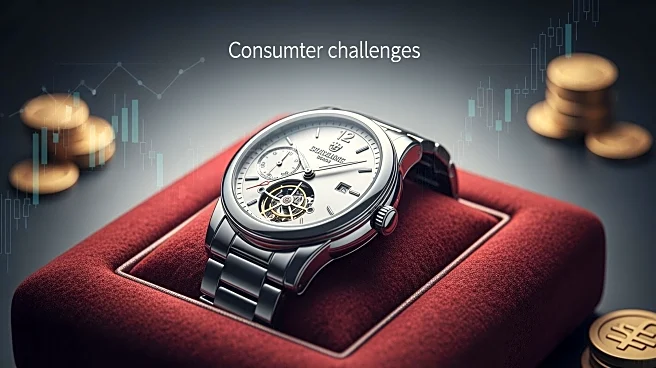What's Happening?
Luxury watch brands are navigating a complex landscape as consumer sentiment shifts amid economic concerns. According to a survey of over 1,000 readers from Vogue and GQ across various countries, including
the US, consumers are increasingly worried about the rising cost of living and broader economic instability. Despite these challenges, the luxury watch market remains resilient, with brands like Rolex, Cartier, and Omega maintaining their dominance in the Vogue Business Watch Index. The survey reveals that while 68% of consumers are concerned about living costs, and 66% about the economy, watches are perceived as a more stable investment compared to fashion. Notably, 63% of consumers do not plan to change the brands they purchase, indicating a strong brand loyalty within the watch sector.
Why It's Important?
The findings highlight the enduring appeal of luxury watches even in times of economic uncertainty. This resilience is crucial for the industry, as it suggests that high-end watches are seen as valuable assets, potentially offering a hedge against inflation and economic downturns. Brands that maintain strong consumer sentiment and advocacy, such as Rolex and Cartier, are likely to continue thriving. However, the economic concerns could lead to shifts in consumer behavior, with some opting to trade down to cheaper brands, while others may trade up to more expensive labels. This dynamic presents both challenges and opportunities for watchmakers to refine their strategies and strengthen their market positions.
What's Next?
Luxury watch brands may need to adapt their marketing and product strategies to address consumer concerns about economic stability. This could involve emphasizing the investment value of their products or enhancing brand messaging to resonate with consumers seeking reliability and prestige. Additionally, brands might explore expanding their offerings to include more accessible price points or limited editions to attract a broader audience. As economic conditions evolve, watchmakers will need to remain agile and responsive to consumer sentiment to sustain their market presence.
Beyond the Headlines
The luxury watch industry’s ability to withstand economic pressures underscores the cultural significance and aspirational value of these products. Watches are not merely timekeeping devices but symbols of status and craftsmanship, which can transcend economic fluctuations. This cultural dimension may continue to drive demand, particularly among consumers who view luxury watches as timeless investments. Furthermore, the industry’s focus on innovation and design could play a pivotal role in maintaining consumer interest and loyalty.









